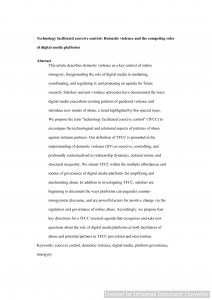Cybercrimes
Technology Facilitated Coercive Control
 Full Article Title: Technology Facilitated Coercive Control: Domestic Violence and the Competing Roles of Digital Media Platforms
Full Article Title: Technology Facilitated Coercive Control: Domestic Violence and the Competing Roles of Digital Media Platforms
Open Access: No
Abstract
This article describes domestic violence as a key context of online misogyny, foregrounding the role of digital media in mediating, coordinating, and regulating it; and proposing an agenda for future research. Scholars and anti-violence advocates have documented the ways digital media exacerbate existing patterns of gendered violence and introduce new modes of abuse, a trend highlighted by this special issue. We propose the term “technology facilitated coercive control” (TFCC) to encompass the technological and relational aspects of patterns of abuse against intimate partners. Our definition of TFCC is grounded in the understanding of domestic violence (DV) as coercive, controlling, and profoundly contextualised in relationship dynamics, cultural norms, and structural inequality. We situate TFCC within the multiple affordances and modes of governance of digital media platforms for amplifying and ameliorating abuse. In addition to investigating TFCC, scholars are beginning to document the ways platforms can engender counter-misogynistic discourse, and are powerful actors for positive change via the regulation and governance of online abuse. Accordingly, we propose four key directions for a TFCC research agenda that recognises and asks new questions about the role of digital media platforms as both facilitators of abuse and potential partners in TFCC prevention and intervention.
Citation
Dragiewicz, M., Burgess, J., Matamoros-Fernández Ariadna, Salter, M., Suzor, N. P., Woodlock, D., & Harris, B. (2018). Technology facilitated coercive control: domestic violence and the competing roles of digital media platforms. Feminist Media Studies, 18(4), 609–625. https://doi.org/10.1080/14680777.2018.1447341
